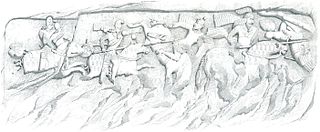Related Research Articles
The 380s decade ran from January 1, 380, to December 31, 389.
The 180s decade ran from January 1, 180, to December 31, 189.
The 270s decade ran from January 1, 270, to December 31, 279.
The 360s decade ran from January 1, 360, to December 31, 369.
The 330s decade ran from January 1, 330, to December 31, 339.

Year 253 (CCLIII) was a common year starting on Saturday of the Julian calendar. At the time, it was known as the Year of the Consulship of Volusianus and Claudius. The denomination 253 for this year has been used since the early medieval period, when the Anno Domini calendar era became the prevalent method in Europe for naming years.
The 220s decade ran from January 1, 220, to December 31, 229.
The 230s decade ran from January 1, 230, to December 31, 239.
The 240s decade ran from January 1, 240, to December 31, 249.
The 250s was a decade that ran from January 1, 250, to December 31, 259.
The 260s decade ran from January 1, 260, to December 31, 269.
Year 388 (CCCLXXXVIII) was a leap year starting on Saturday of the Julian calendar. At the time, it was known as the Year of the Consulship of Augustus without colleague. The denomination 388 for this year has been used since the early medieval period, when the Anno Domini calendar era became the prevalent method in Europe for naming years.

Year 244 (CCXLIV) was a leap year starting on Monday of the Julian calendar. At the time, it was known as the Year of the Consulship of Armenius and Aemilianus. The denomination 244 for this year has been used since the early medieval period, when the Anno Domini calendar era became the prevalent method in Europe for naming years.
Year 243 (CCXLIII) was a common year starting on Sunday of the Julian calendar. At the time, it was known in Rome as the Year of the Consulship of Arrianus and Papus. The denomination 243 for this year has been used since the early medieval period, when the Anno Domini calendar era became the prevalent method in Europe for naming years.
Year 241 (CCXLI) was a common year starting on Friday of the Julian calendar. At the time, it was known as the Year of the Consulship of Gordianus and Pompeianus by the Romans. The denomination 241 for this year has been used since the early medieval period, when the Anno Domini calendar era became the prevalent method in Europe for naming years.

Year 260 (CCLX) was a leap year starting on Sunday of the Julian calendar. At the time, it was known as the Year of the Consulship of Saecularis and Donatus. The denomination 260 for this year has been used since the early medieval period, when the Anno Domini calendar era became the prevalent method in Europe for naming years.
Year 182 (CLXXXII) was a common year starting on Monday of the Julian calendar. At the time, it was known as the Year of the Consulship of Sura and Rufus. The denomination 182 for this year has been used since the early medieval period, when the Anno Domini calendar era became the prevalent method in Europe for naming years.

Year 224 (CCXXIV) was a leap year starting on Thursday of the Julian calendar. At the time, it was known as the Year of the Consulship of Iulianus and Crispinus. The denomination 224 for this year has been used since the early medieval period, when the Anno Domini calendar era became the prevalent method in Europe for naming years.

Gaius Vibius Trebonianus Gallus was Roman emperor from June 251 to August 253, in a joint rule with his son Volusianus.
The Battle of Barbalissos was fought between the Sasanians and Romans at Barbalissos. Shapur I used Roman incursions into Armenia as pretext and resumed hostilities with the Romans. The Sassanids attacked a Roman force of 60,000 strong at Barbalissos and the Roman army was destroyed. The defeat of this large Roman force left the Roman east open to attack and led to the eventual capture of Antioch and Dura Europos three years later. This battle is only known through Shapur I's inscription at Naqsh-e Rostam.
References
- ↑ Edwards, Iorwerth Eiddon Stephen; Bowman, Alan; Garnsey, Peter; Cameron, Averil (1970). The Cambridge Ancient History: Volume 12, The Crisis of Empire, AD 193-337. Cambridge University Press. p. 469. ISBN 978-0-521-30199-2.